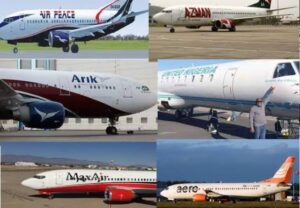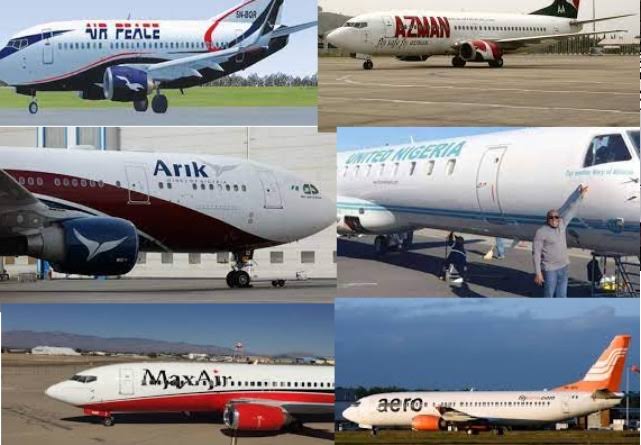
There are indications that domestic carriers may reduce their workforce, as they struggle to sustain their operations in the face of high cost of aviation fuel, which is currently about N950 per litre.
THISDAY investigations revealed that some airlines are already reviewing their workforce and see sacking workers as their last option, which also signals some of the airlines may ground their operations.
Informed source from Aero Contractors told THISDAY that the company has embarked on the rationalization of its workforce, but those affected are the personnel engaged in schedule operation.
The airline, however, expressed the hope that it would resume schedule service when it acquires aircraft and would recall the workers sent home after it suspended service a fortnight ago.
“They don’t have schedule operations so they have to reduce their staff; those involved in schedule service. Once they acquire planes they would call them back. The current management has to be commended because the challenge they faced was enormous, but they will bounce back and those workers will resume work. So let’s put it this way; that the airline embarked on rationalization to cut cost,” the inside source told THISDAY.
Informed source also said that it is extremely difficult to survive under the current operational environment but airlines are helping themselves by taking advantage of the spring alliance, which is the code-share partnership, they formed few months ago.
Airlines that have fewer passengers would board them in another airline’s flight and later reconcile accounts, as the alliance has fixed fare for all the destinations. Also, few airlines that are not part of the alliance have re-protection agreement, whereby they take passengers from their partner airlines on negotiated fares.
THISDAY also learnt that before the current increase in the cost of aviation fuel, some airlines had already reduced their workforce due to the COVId-19 pandemic that devastated global economy and adversely affected domestic and international carriers.
Head of Communication of Arik Air, Adebanji Ola, told THISDAY that currently that the airline does not have any plan to sack any staff, disclosing that currently the airline has over 1000 staff, contrary to reports that the airline personnel has reduced to 500.
However, he said that many of Arik Air’s workers that were on redundancy during the COVID-19 lockdown had been recalled but the remaining had been given severance settlement with effective supervision of the unions.
“We don’t have plans to sack workers currently. We sent workers home during the pandemic but we have recalled a lot of them from redundancy and this had been concluded long time ago. They were given redundancy in conjunction with the union. Those who we didn’t recall were given very good redundancy package. I can tell you that Arik Air is one of the strongest airlines in Nigeria today,” Arik spokesman said.
The image-maker of United Nigeria Airlines, Archilles Uchegbu, told THISDAY that the airline has the number of personnel it needs, adding that it is even expanding its operation because in next few weeks it would extend flight operations to Jos and Benin.
“We are expanding operations. We are not sacking. We want to open Benin and Jos routes; we are expanding. We have five aircraft and we want to lease the sixth aircraft as we expand our service,” he said.
Airlines said that they couldn’t continue to increase airfares in response to the increase in the cost of aviation fuel because the number of passengers has already depleted and further increase of airfares would further reduce passenger traffic on domestic routes.
THISDAY checks indicated that cost ticket is very high if passenger buys ticket on the day he is going to travel. But checks on the airline website showed that there are still relatively low prices for tickets. For example, Arik Air for August 2, 2022 showed that Lagos-Abuja flight for 6:50 am was N56, 000 and 9:50 am flight was N71, 000. Air Peace Lagos-Abuja flight by 6:30 am was N78, 000; 8:20 am flight was, N82, 000: 10:30 pm flight was N82, 000, while 12:45 pm flight was N78, 000 and 5:00 pm flight was N75, 000.
Azman Air Kano-Lagos flight was N100, 000; Max Air Kano-Jos flight was N100, 000, while Max Air Abuja-Jos flight was N55, 000. Arik Air Lagos-Jos flight was N80, 000, while return ticket was N57, 000.
The Managing Director of Flight and Logistics Solutions Limited, Amos Akpan, told THISDAY that airlines sacking their workforce would be the last resort and that indicated that the airlines are also on the verge of going under.
“Airlines may sack their workers as last resort, which means that they won’t be able to cope with their operations due lack of funds. It also indicates that the airlines are on their way out. The purchasing power (money for travels) of the existing and potential air travelers has its elastic limit, which is determined by the country’s economy. There is a point the airlines fare will cause low patronage of their services because the economic realities will force current air travelers to look for purse friendly alternative mode of traveling within Nigeria. The security situation may have forced more people to choose air travels. But virtual meetings and electronic transactions have become alternative to physical travels. These alternatives will cause low patronage, which will cause low yield, which will constrain airlines to provide lower capacity per route. This may lead to limited frequency and could constrict size of domestic operations.
This scenario is the primary reason airlines should be allowed to determine the prices for their products and services. Economic realities will push the airlines to adjust their business modules,” he said.






